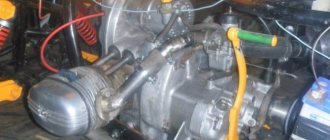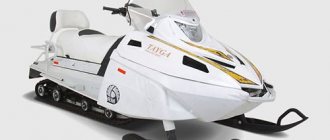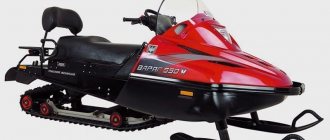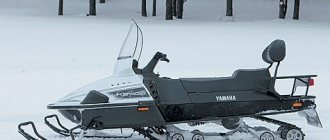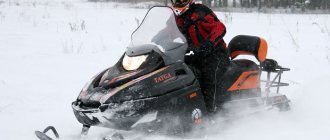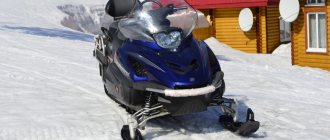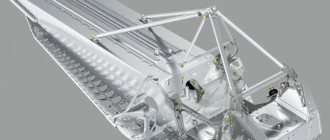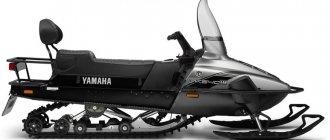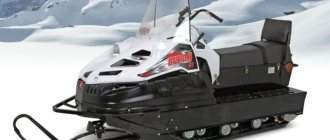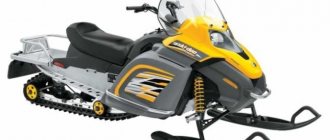Paramotor RMZ - 550 is one of the most powerful paramotors.
- It has a titanium frame and guard
- equipped with RMZ-550 engine (analogous to ROTAX 502)
- its design allows it to be reconfigured for solo or tandem flights.
- The thrust developed by more than 100 kg makes it possible not only to take off confidently, but also to actively maneuver with a weight of up to 300 kg.
- The engine is equipped with manual and electric starters.
- The battery is recharged from the generator.
The RMZ-550 piston engine is a gasoline, two-stroke, two-cylinder, in-line cylinder, with an air cooling system, with an electronic ignition system.
Equipped with a resonant type exhaust system.
Technical data
| Engine | RMZ - 550 |
| Type | Two-cylinder, two-stroke, air cooled |
| Working volume, cm3 | 553 |
| Piston diameter and stroke, mm | 72 / 61 |
| Engine weight*, kg | 32 |
| Compression ratio | 10,8 |
| Power max., hp | 50 |
| Speed max. | 6250 rpm |
| Fuel | Gasoline AI-92 - AI-95 mixed with synthetic oil 2% |
| Oil | Synthetic for two-stroke air-cooled engines |
| Fuel consumption**, l/hour | 8. 10 |
| Gearbox | Poliklinova |
| Gear ratio | 1:2,35 |
| Spark plug | NGK B9ES or NGK BR9ES |
| Fuel system | MIKUNI VM 34-621 2 pcs. |
| Ignition system | electronic "DUCATI" |
| Recommended glider type | NOVA Bion |
*Engine weight with resonator and muffler. **Fuel consumption during horizontal flight.
Source
Weaknesses and shortcomings of the RMZ 550 engine
The RMZ 550 power unit is produced by RM Detail LLC, a subsidiary of Russian Mechanics JSC. This power unit consists of a two-stroke engine and a gearbox (variator). Designed to equip domestic Taiga snowmobiles produced by Russian Mechanics JSC.
The RMZ 550 two-stroke engine used on domestically produced snowmobiles under the Taiga brand combines high reliability and ease of repair. During major repairs, cylinders can be bored to the nearest repair dimensions, and commercially available parts and ass. CPG and ShPG units according to groups of repair sizes make repairs cheaper. I will provide information about the most possible weak points and shortcomings of the motor that one encounters when operating Taiga snowmobiles.
Snowmobile Taiga ST-500 - configuration options:
Basic equipment Snowmobile Taiga ST-500D (С 40000010) Single-carburetor engine, without electric start, fuel mixture (AI-92 gasoline)
Equipment No. 1 Snowmobile Taiga ST-500D (C 40000010-001) Single-carburetor engine, with electric start, fuel mixture (AI-92 gasoline)
Equipment No. 2 Snowmobile Taiga ST-500D (C 40000010-002) Two-carburetor engine, with electric start, separate lubrication system, fuel mixture (AI-92 gasoline)
Characteristics of the RMZ 550 engine
| By number of cylinders | Double cylinder |
| By number of cycles | Push-pull |
| Volume, cm 3 | 553 |
| Power, hp | 55 |
| Cylinder diameter, mm | 76 |
| Piston stroke, mm | 61 |
| Fuel supply system | Two carburetors |
| Carburetors | Mikuni (Japanese) |
| Cooling | Air |
| Exhaust system | Muffler with resonator |
| Intake system | Reed valve |
| Lubrication system | Joint |
| Maximum speed, km/h | 80 |
Weaknesses of the RMZ 550 engine
The pistons burn out. This problem is relevant for engine models produced before May 2013. The reason is a manufacturing defect: a deviation of the ignition timing by 3-5 degrees in the Ducati ignition system, which contributes to an increase in temperature during the exhaust stroke. This defect did not bypass the RMZ motors: 250; 551, which have the same ignition system. To prevent piston burnout and eliminate the defect, it is necessary to correctly adjust the ignition timing.
Ignition coil. If there are problems with the spark plugs, they often fail. A spare coil must be included in the transported spare parts.
Spark plug. If the spark plugs are faulty (carbon deposits, large gaps), backfires occur when the engine is running, and the internal combustion engine does not develop maximum power and maximum speed. To eliminate the defect, it is necessary to inspect the spark plugs for the presence of carbon deposits, remove carbon deposits if present, or replace the spark plugs. In addition, it is necessary to check the gap between the electrodes and bring it into compliance with 0.75 ± 0.05 mm.
Ignition. The ignition must be set very precisely. With early ignition, as with faulty spark plugs, backfire occurs during operation.
Leaking gaskets. Protrusions and oil leaks from under the oil pan gasket should not be ignored. If there are oily spots on the engine (under it), it is necessary to take measures to replace faulty parts. For uninterrupted operation, the engine must be periodically pressurized under a pressure of 0.35-040 kgf/cm² for 3 minutes, and the pressure should not drop for 3-5 minutes, since leaks in the internal combustion engine cannot always be determined by visible signs. If this is not done, then at one point the oil may leak out, and if there is no oil, the internal combustion engine will inevitably fail.
Carburetors. They require fine tuning for synchronous operation in all engine operating modes. Problems common to all carburetors: clogged jets, fuel leakage.
Fuel pump. If it fails, the operation of the internal combustion engine becomes impossible. To avoid problems during the trip, you should have a spare pump with you.
Variable speed drive. Requires periodic adjustment.
Belt variator. It is necessary to check the tension and condition of the belt daily. If the belt wears 3 mm in width, it needs to be replaced. Otherwise, the engine will not be able to develop maximum speed and power.
Fan belt. Failure to adjust the tension and wear of the belt leads to slippage and deterioration of the fan operation, and at the same time the engine overheats.
The rubber cushions (shock absorbers) under the engine are torn. The reason is poor quality tires.
Description of the snowmobile model
When designing the Taiga 500 and Taiga 550 snowmobiles, the design team adhered to the principles of exceptional utilitarian design without compromising the basic technical characteristics and necessary comfort. One of the distinctive features of the model is the high-mounted steering wheel, which makes it possible to perform active maneuvers in a standing position. The snowmobile's seat has two-level adjustment, and the steering wheel grips are equipped with autonomous heating. The windshield is high enough to protect your face, and underneath it is a high-power headlight.
The gearbox is two-stage with a reduction gear. The ignition system is programmable, it provides optimal parameters for engine operation in all modes. The front suspension is built according to a telescopic design and has a stroke length of 105 mm. The rear suspension travel is almost twice as long and is 190 mm. It is characterized by sufficient energy intensity due to the presence in its design of a hydropneumatic shock absorber and twisted torsion springs. This ensures the required smoothness, regardless of the weight of the cargo being transported. Electrical equipment:
- ignition - programmable;
- headlight - halogen;
- heated steering wheel is an option.
The snowmobile track has a width of 500 mm. The heel of the rear suspension can be bent to make reversing easier. Under the reclining seat there is a luggage compartment that has sufficient volume to carry tools and personal items needed for a trip. Thanks to a reduction in total weight by 15 kg compared to the previous generation model, the Taiga Varyag 500 is in no way inferior to other models of the Varyag family with engines with higher power in terms of thrust-to-weight ratio and other driving characteristics. Dimensions:
- length - 3 meters;
- width - 1.4 meters;
- height - 1.4 meters;
- caterpillar length - 4 meters;
- caterpillar width - 0.5 meters;
- track width - 0.9 meters.
Disadvantages of the RMZ 550 engine
- Poor quality installation of spark plugs on armored ignition wires during assembly in production. A simple auditory defect causes the destruction of the CPG. The problem was identified on snowmobiles manufactured before May 1, 2013;
- Piston jamming. This happens when the engine speed is rapidly increased when the engine is not warmed up. Cold cylinders, due to their larger volume and mass, expand more slowly when the engine starts running than pistons;
- Huge fuel consumption. On average from 25 to 27 liters per 100 km;
- Uneconomical to operate;
- Low resource. The main disadvantage of all two-stroke internal combustion engines, especially air-cooled ones, is the low service life of the engine before major repairs. For RMZ 550, the resource is within the range of 3,000 - 5,000 km.
- Prone to overheating due to design flaws, which is the main criterion for the problem of low resource reserve.
PS Dear owners of Taiga snowmobiles: Varyag 550 V SE, V, Patrul SWT! You can add your opinions on internal combustion engines and reviews through the comment form.
Source
Video • Selecting a snowmobile
| Consumption of RMZ-500 (what is the consumption of your RMZ?): Forums And yet, there are a number of shortcomings characteristic of truly Russian technology: the smell of burnt rubber from the muffler, a high noise level compared to my neighbor’s Yamaha, starting in any weather is possible only with manual starter. You should choose oil for a snowmobile even more carefully than for a car, and also take into account a number of criteria determined by the specifics of snowmobile engines. |
| Snowmobile Taiga: Varyag 550 V, SWT, ST 500D, Attack 551, Bars 850, 800, Patrol, owner reviews, technical characteristics, price, device, length, caterpillar, dimensions It is necessary to remove gears 35, 38 and 36 along with the 37 axle bushing brake from the body part 10 of the switch box, unscrew bolt 3 of overhead line 2 of the variator and remove washer 4. This brand has very few analogues, since Taiga conquered the Russian market and became popular due to its rare assembly and unusual characteristics. |
- Front headlight type: halogen.
- Taillight type: LED.
- Heated steering wheel and throttle trigger are standard.
Engine RMZ - 500 avia
The domestic 2-cylinder engine RMZ 500 is an analogue, or rather a complete copy of the “authoritative” ROTAX 503.
With the domestic quality of “reproduction” I lost 2 hp of power, but otherwise it was quite affordable on a budget
and a very reliable engine. RMZ 550 is an attempt (increased displacement slightly) to gain lost power
when copying ROTAX. Otherwise, they are no different from 500 thousand.
Technical characteristics of RMZ - 500
| Engine type, model | RMZ-500/RMZ-550 |
| Number of cylinders | 2 |
| Weight KG | 38.1 |
| Working volume in cm cubic. | 496.7 |
| Power, kWt. | 35.52 |
| HP power | 48 |
| Revolutions per minute | 6200-6500 |
| Torque Nm | 52,8 / 55 |
| Revolutions per minute | 6000 |
| Electronic ignition system | There is |
| Carburetor | 2 |
| Air filter | 2 |
| Fuel pump | There is |
| Recoil starter | There is |
| Electric starter | — |
| Muffler | — |
| Cooling | Air forced |
Everything you see on our website can be bought: paragliders, hang gliders, paramotors, paragliders and other UAVs, as well as radio communications, navigation, etc., call and write to [email protected] Skype: amd7373. We send equipment to the regions by postal or transport company. It is also possible to rent paragliding and hang gliding equipment on our flights.
Attention! The structural elements used in the aircraft we produce cannot be used in aircraft of other manufacturers without appropriate adaptation modifications! Since each manufacturer has its own standards.
Source
Snowmobile engine Taiga ST-500 - how much oil to fill. Operating Parameters
| PURPOSE | passenger | ||
| COMMON DATA | |||
| Overall dimensions, mm: | length without skis | 2813 | |
| width | 1025 | ||
| height with glass | 1324 | ||
| between skis | 875 | ||
| Weight, kg | dry (net/gross) | 290/330 | |
| full | 540 | ||
| trailer | 250 | ||
| Noise level, dB, no more | 84 | ||
| PERFORMANCE CHARACTERISTICS | |||
| Capacity, persons | 2 | ||
| Speed max., km/h | 80 | ||
| Davl. on supporting surfaces, kPa / kg/cm2 | 0.035 | ||
| Max slope (ascent, descent), degrees. | 22 | ||
| Turning radius, m. no more | 6 | ||
| Braking distance, m, no more | 11 | ||
| ENGINE | |||
| Type | carburetor | ||
| Model | PM3-500 | ||
| Number of strokes/cylinders | 2/2 | ||
| O cylinder/piston stroke, mm | 72/61 | ||
| Working volume, cm cubic. | 497 | ||
| N maximum, kW/hp | 36,7/50 | ||
| Lubrication system | separate | ||
| Lubricant type | Slavneft M-12TP(s), BOMBARDIER FORMULA XP-S, Motul Snowpower 2T AS Ester, Ekoil-2T-Arctic | ||
| Starting system (electric starter) | + | ||
| Cooling system | forced air from axial fan | ||
| SUPPLY SYSTEM | |||
| Number of carburetors | 2 (Mikuni VM32-303) | ||
| Fuel | AI-92 | ||
| Fuel tank volume, l | 40 | ||
| TRANSMISSION | |||
| Type | automatic, in 2 versions | ||
| Transmission | 2-speed (traction, speed) | ||
| CVT (in 2 versions) | V-belt with automatic stepless change of gear ratio | ||
| Belt variator | USA H=33 mm | ||
| Reverse box | |||
| Transmission to track drive shaft | gear | ||
| CHASSIS | |||
| Mover | tracked, with front sprockets | ||
| Caterpillar | Type | rubber-fabric, reinforced with rods | |
| Number | 1 | ||
| LxB, mm | Russia | 3937×500 | |
| Steel slewing skis | 2 | ||
| Track suspension type | slimy | ||
| Ski suspension type | telescopic | ||
| Shock absorbers | pneumo-hydraulic | ||
| CONTROL AND INSTRUMENTATION MECHANISMS | |||
| Control | motorcycle type steering wheel | ||
| Working brake | disk | ||
| Parking brake | + | ||
| Shifting gearbox reverse | manual with mechanical drive | ||
| Speedometer/trip meter | induction mechanical drive | ||
| ELECTRICAL EQUIPMENT | |||
| Electricity source, AB, 12 V | VARTA 52012 | ||
| Ignition system | DUCATI CDI | ||
| Snowmobiles Taiga ST-500, Varyag 550, Patrol 551 SWT, Bars 850 what kind of engine oil to pour and how much to pour In the Patrol version, a gearbox with a low range is installed, and the more expensive Attack modification received a 60-horsepower liquid-cooled engine, providing a maximum speed of over 100 km hour. The developers chose for their brainchild technical solutions that have proven themselves in practice, installing a telescopic fork at the front with a stroke length of 105 mm, and a skid plate suspension at the rear with a stroke of 190 mm. |
- width - 1.05 m;
- height - 1.38 m;
- snowmobile length - 2.99 m.
Advice from experts • Our frosts this month ranged from 25 to 47.
